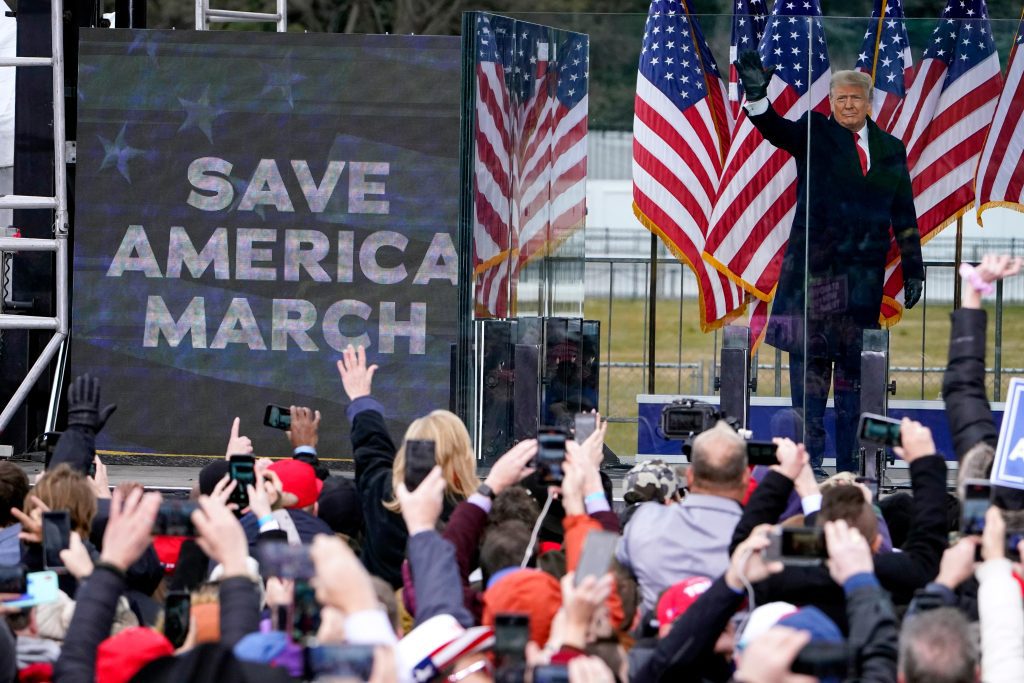By ERIC TUCKER (Associated Press)
WASHINGTON — The Supreme Court will hear arguments Thursday about whether Donald Trump is protected from prosecution in a case alleging that he plotted to overturn the results of the 2020 presidential election..
This is a significant day for the court, as the justices will decide if former presidents can be prosecuted for official actions taken while in the White House.
However, between a long-standing court case involving Richard Nixon and a little-known constitutional provision about presidential impeachments, there will likely be some unfamiliar concepts and terms used.
Here are some pointers to help understand everything:
WHEN DOES THE SESSION BEGIN?
The court marshal will start the session at 10 a.m. EDT and Chief Justice John Roberts will announce the start of arguments in Donald J. Trump vs. United States of America, as the case is known.
The session could easily last two hours or more.
WHERE CAN I WATCH THE LIVESTREAM?
There are no cameras in the courtroom, but since the pandemic, the court has live-streamed its argument sessions. Listen live on apnews.com/live/trump-supreme-court-arguments-updates or the court’s website at www.supremecourt.gov. C-SPAN will also air the arguments at www.c-span.org.
IMPEACHMENT CLAUSE
Expect to hear discussion about the impeachment process and the connection, if any, to criminal prosecution.
At the core of Trump’s immunity argument is the assertion that only a former president who was impeached and convicted by the Senate can be criminally prosecuted. Trump was impeached for his efforts to overturn the election in the lead-up to the violent riot at the U.S. Capitol on Jan. 6, 2021. But he was acquitted, not convicted, by the Senate in 2021.
Trump’s lawyers point to a provision of the Constitution called the Impeachment Judgment Clause to support their argument. It states that an officeholder convicted by the Senate shall still be “liable and subject to indictment, trial, judgment and punishment” in court.
Prosecutors argue that Trump's team is misinterpreting the clause and that Senate conviction is not a prerequisite for a courtroom prosecution.
WAIT, WHAT’S THIS ABOUT RICHARD NIXON?
There will be a lot of talk about Nixon, but not necessarily for the reasons one might expect.
Trump’s team has repeatedly highlighted a 1982 case, Nixon v. Fitzgerald, in which the Supreme Court ruled that a former president cannot be sued in civil cases for their actions while in office. The case revolved around the firing of an Air Force analyst, A. Ernest Fitzgerald, who testified before Congress about cost overruns in the production of a transport plane.
Fitzgerald’s lawsuit against Nixon, who was president at the time of the 1970 termination, was unsuccessful. Justice Lewis Powell wrote for the court, stating that presidents are entitled to absolute immunity from civil lawsuits for acts falling within the “outer perimeter” of their official duties.
Importantly, that decision did not protect presidents from criminal liability, although Trump’s team argues that the same analysis should apply.
Jack Smith’s team of special investigators is expected to mention a separate Supreme Court decision involving Nixon that they believe supports their case — a 1974 opinion that required the president to provide incriminating White House tapes for use in the prosecutions of his top aides.
Prosecutors have also pointed out that Nixon accepted, rather than turned down, a subsequent pardon from President Gerald Ford — a recognition by the men, they argue, “that a former President could face prosecution.”
DRONE STRIKES AND SEAL TEAM SIX
The justices are known for asking hypothetical scenarios to lawyers in order to test the scope of their arguments. Anticipate this practice to be fully on display Thursday as the court examines whether former presidents are entitled to absolute immunity.
Already, Trump’s lawyers have cautioned that if the prosecution is allowed to proceed, it would lead to criminal charges against other presidents, such as for approving a drone strike that kills a U.S. citizen or for providing false information to Congress that leads the country into war.
During arguments in January before a federal appeals court, a judge asked a Trump lawyer whether a president who ordered a Navy SEAL to assassinate a political rival could be prosecuted.
Expect Smith’s team to try to differentiate between acts that it argues are essential exercises of presidential power — such as ordering a drone strike during war — and the acts that Trump is accused of in this case, such as participating in a scheme to organize fake electors in battleground states. Those acts, prosecutors argue, are personal acts and not presidential ones.
___
Get more Colorado news by signing up for our daily Your Morning Dozen email newsletter.



